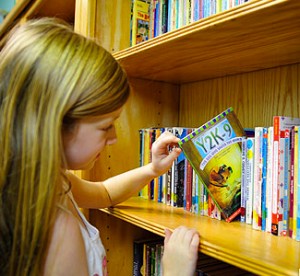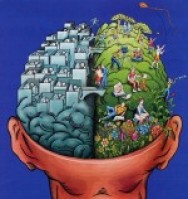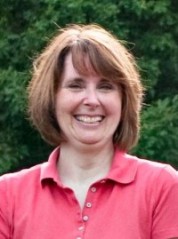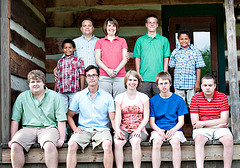 I was called “the bookworm” in my family of birth. Two of my siblings were considered “not good at reading,” and the other “didn’t bother.” I remember each of us children received a label maker as our only “fun gift” for Christmas one year; mine was a bookworm. My other gift was a sheet set for my bed. Needless to say, we weren’t blessed financially in my growing up years; therefore, both gifts were greatly appreciated.
I was called “the bookworm” in my family of birth. Two of my siblings were considered “not good at reading,” and the other “didn’t bother.” I remember each of us children received a label maker as our only “fun gift” for Christmas one year; mine was a bookworm. My other gift was a sheet set for my bed. Needless to say, we weren’t blessed financially in my growing up years; therefore, both gifts were greatly appreciated.
My mother enjoyed books, too. We had two bookshelves spotlighted in our living room, on either side of the television. I remember my mother purchasing a set of World Book encyclopedias. It must have been quite a sacrifice for my parents to obtain. I enjoyed lovingly turning the pages of those books. Around fourth grade, I began to receive books for my Christmas presents. They were meticulously displayed in my own little bookshelf in my room. I was the only child with books in my room. I still have every one of those books, gifted to my daughter now and displayed in her room.
 Interestingly, as much as my mother loved books herself, she was not the type to read aloud to any of us. Maybe she did when we were babies, but she didn’t as far as I can remember. She also didn’t teach me to read, although I begged her almost on a daily basis the summer before first grade. She simply kept up the mantra, “Wait until first grade.” She also didn’t specifically share her joy of books with me that I remember. I do remember seeing her read, though. She also brought me to the public library from time to time. I vividly remember the sensory experience of walking through those doors: the smells, the rows and rows of books of all styles and sizes, the hushed tones; it was sacred ground.
Interestingly, as much as my mother loved books herself, she was not the type to read aloud to any of us. Maybe she did when we were babies, but she didn’t as far as I can remember. She also didn’t teach me to read, although I begged her almost on a daily basis the summer before first grade. She simply kept up the mantra, “Wait until first grade.” She also didn’t specifically share her joy of books with me that I remember. I do remember seeing her read, though. She also brought me to the public library from time to time. I vividly remember the sensory experience of walking through those doors: the smells, the rows and rows of books of all styles and sizes, the hushed tones; it was sacred ground.
When I became an adult, the first thing I desired was to have a houseful of books. In fact, the first items I placed in my hope chest were books I subscribed to receive through a classic’s book club. After I married, and as we began our family, I also desired to share my love of books with my children. Collecting children’s books were first on my agenda in decorating the nursery. Unlike my mother, I began to read to my children from the beginning. Each has developed their own relationship with books. My children have taught me that the classic “bookworm” has a conditioned aspect to it. There are many facets to the enjoyment of books.
I discovered there is a false conditioning that a bookworm is one who reads a lot for pleasure. My firstborn artist son spent hours upon hours looking at books on his own starting at one year old. He started with the picture books we read to him, but by two years old, he was insisting on beginning our extensive collection of non-fiction books. These were his preference, enjoying books such as 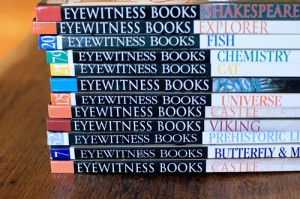 Eyewitness books, atlases, animal books, dinosaurs, etc. My artist son loves books for the information he gains from them. He does read books for pleasure from time to time, and yet, his focus still seems to be about gaining information from the book. For instance, he loves The Lord of the Rings series, but really, I wonder if it’s because he continually seeks information about fantasy characters, which he does a lot of developing on his own through his drawing. At nine years old, when my artist son began to read, his first book was The Lost World. Why? Because he loved dinosaurs, but he felt the movie of the same name was too graphic for his tastes, so he wanted to gain the information through the book. Most of my artist son’s pleasure reading came through our family read aloud times. He stayed a part of this tradition until 18 years old. Throughout his childhood and to this day, he always has scads of books next to and in his bed: researching, looking, scanning, information-based.
Eyewitness books, atlases, animal books, dinosaurs, etc. My artist son loves books for the information he gains from them. He does read books for pleasure from time to time, and yet, his focus still seems to be about gaining information from the book. For instance, he loves The Lord of the Rings series, but really, I wonder if it’s because he continually seeks information about fantasy characters, which he does a lot of developing on his own through his drawing. At nine years old, when my artist son began to read, his first book was The Lost World. Why? Because he loved dinosaurs, but he felt the movie of the same name was too graphic for his tastes, so he wanted to gain the information through the book. Most of my artist son’s pleasure reading came through our family read aloud times. He stayed a part of this tradition until 18 years old. Throughout his childhood and to this day, he always has scads of books next to and in his bed: researching, looking, scanning, information-based.
My second child, my writer daughter, is your stereotypical bookworm. When she was around five years old, she always had stacks of Dr. Seuss books next to her bed. Soon thereafter, I was to discover she could read. My artist son never read Dr. Seuss. Since that time, my writer daughter always has a fiction book going. She always enjoyed our family read aloud tradition, and continues to join in if we take up a book now and again.
My third child has always been a builder . . . LEGO, Technics, popsicle sticks, anything he could get his hands on. He’s a computer programmer now at 15. He never enjoyed reading for pleasure, hardly ever looked at books to research, but  was always drawn to instructional material, whether it was LEGO books or “How Things Work” books. He learned to read at 11, and still reads for instructional purposes. I wondered if he limited himself to this style of reading because he had not acquired enough “practice” in reading compared to the other two children. My conjecture was put to rest after he began pursuing his interest in computer programming and I saw him carrying around the programming books like it was his bible. Right now, he is trudging through an adult programming book called, Programming Windows: The Definitive Guide to the Win32 API. I don’t worry anymore.
was always drawn to instructional material, whether it was LEGO books or “How Things Work” books. He learned to read at 11, and still reads for instructional purposes. I wondered if he limited himself to this style of reading because he had not acquired enough “practice” in reading compared to the other two children. My conjecture was put to rest after he began pursuing his interest in computer programming and I saw him carrying around the programming books like it was his bible. Right now, he is trudging through an adult programming book called, Programming Windows: The Definitive Guide to the Win32 API. I don’t worry anymore.
So, with my first three children, I have an instructional reader, a pleasure reader, and an information reader. Each style of reading is valued, and I consider them all “bookworms” in their own right. I have to wonder if my siblings of birth, who didn’t read for pleasure, may have enjoyed a different style of reading if any of their environments had valued it. Currently, we have at least ten five-shelf bookshelves and ten three-shelf bookshelves filled with books. Every bedroom has at least two bookshelves, and the rest are in the office, upstairs hallway, and the family room. We have pleasure books, information books, and instructional books. We have visual books of each kind such as comic books, manga, pictorial science experiments, pictorial cookbooks, atlases, Eyewitness books, etc.. We have traditional books of each kind such as classics, novels, A History of US, biographies, computer programming, The Number Devil, etc. I would like to think the variety of material each child led me to purchase, the book-enriched environment, along with unconditioning my thinking about what constitutes a bookworm all contributed to my children each finding their niche with books. Enjoy the individuality within your home!
Originally published in the Life without Schooling blog on September 1, 2006.

